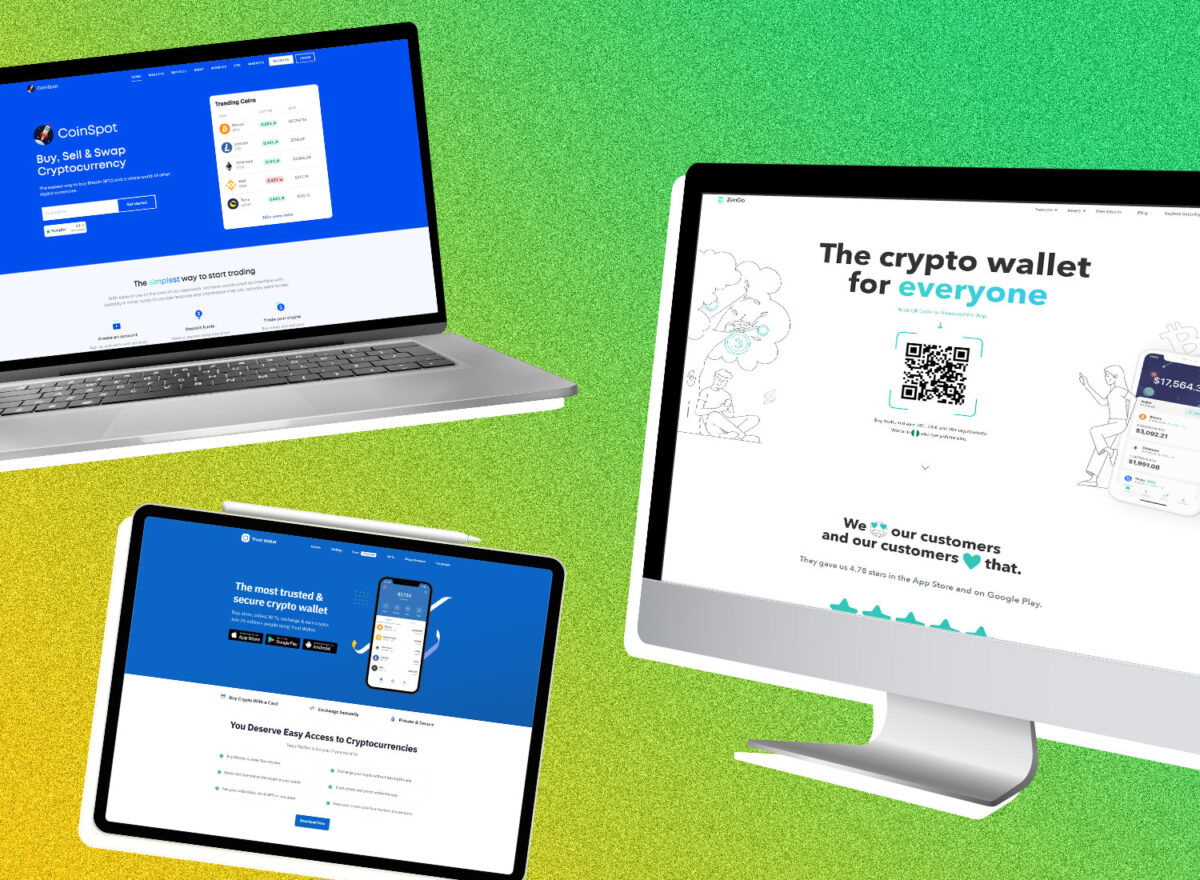Want to know which is the best crypto wallet in Australia? You’ve come to the right place.
Now that cryptocurrency has officially gone mainstream – more than 25% of Australians own some type of digital asset – it’s imperative Australians have one of the best crypto wallets to store their funds securely. With so much money heading into the crypto industry, using a high-security crypto wallet is the number one priority for any crypto investor, regardless of the amount of crypto they own.
You might be thinking “eh, I’ve only 10 bucks worth of crypto”… it’s worth remembering that $10 worth of Bitcoin 10+ years ago would be worth more than $670,000 today. With the number of attempted hacks and dodgy dealings in the world of crypto, having your funds in a secure crypto wallet is by far the most important move you can make from the get-go.
In This Crypto Wallet Article:
What is a Crypto Wallet?
A crypto wallet is a place where you have secure access to your cryptocurrency and digital assets.
Without getting too technical, a crypto wallet doesn’t actually store your cryptocurrency in a new digital space. All cryptocurrencies are stored on their respective blockchain, which is a global decentralised ledger that exists in cyberspace. Your crypto wallet stores the unique address where your cryptocurrency can be found on that blockchain, while also containing the only private key that can access that unique address.
There are two main types of crypto wallet that investors need to be aware of: hot wallets & cold wallets.
A hot wallet is a crypto wallet that is connected to the internet in some way. This makes buying and selling crypto much more convenient. Practically every crypto wallet that you use on a phone or laptop will be a hot wallet.
A cold wallet is a crypto wallet that comes in a physical form and is not connected to the internet. This makes them essentially impossible to hack, which is ideal for investors looking to hold large sums of crypto securely for long periods of time. Cold wallets usually look a lot like a USB stick and work in a similar way.
In this comprehensive crypto wallets review, we will be looking exclusively at hot wallets, and going through absolutely everything you need to know about which hot wallet is best for you and your individual financial needs.
Hot Wallets Explained
Without getting too technical, it’s super important that you don’t get confused when it comes to the different types of hot crypto wallet. Surprisingly, not many crypto investors are aware of, or understand the difference, between the two categories of hot wallets.
These are called custodial and non-custodial crypto wallets.
Custodial (Exchange-Based) Wallets
If you’ve ever opened up an account with a crypto exchange like Coinspot, Binance or Crypto.com then you already have a custodial wallet. A custodial, or exchange-based wallet is essentially built into the platform or app you use to purchase crypto and doesn’t require any extra steps to set up.
A custodial wallet offers the benefit of being extremely user-friendly, as your exchange has “custody” of your wallet, which requires less responsibility from your end in terms of storing passwords and managing security.
Custodial wallets are a great choice for investors who want quick access to buying and selling their digital assets. If you’re opening up your crypto portfolio every day to move things around, offload some Bitcoin in the morning and purchase some ETH in the evening, then having a custodial crypto wallet is probably the best option for you.
Non-Custodial Wallets
Non-custodial wallets on the other hand, usually come in the form of an entirely separate app or program, and it means that there are some extra security measures built in.
When you sign up for a non-custodial crypto wallet, you will be asked to write down a “seed phrase” which is a randomly generated sequence of 12 to 24 words. A seed phrase can also be called your “keys”. A non-custodial wallet is more secure because there isn’t a third party that can potentially prevent you from accessing your crypto assets, however if you lose your seed phrase, you lose your crypto.
Most major crypto exchanges now have their own standalone, non-custodial wallets that are semi-integrated into the native exchange. For example, Crypto.com and Coinbase are both major crypto exchanges that have their own, non-custodial wallet apps that are separate from the exchange. Apart from the security benefits, there is also a psychological advantage to having a separate wallet as it makes it harder to “panic sell” and makes it easier to flex those “diamond hands”.
Hardcore cryptocurrency purists are well-known for repeating the phrase: “not your keys, not your coins”, which is essentially saying that unless you have your crypto stored in a non-custodial wallet, it’s not truly yours…
With all this mind, it’s time to take a look at the best exchange-based (custodial) wallets available for Australian crypto investors in 2023.
Best Custodial (Exchange-Based) Crypto Wallets
CoinSpot
As Australia’s most trusted and secure crypto exchange, CoinSpot is the top choice when it comes to choosing an exchange-based crypto wallet.
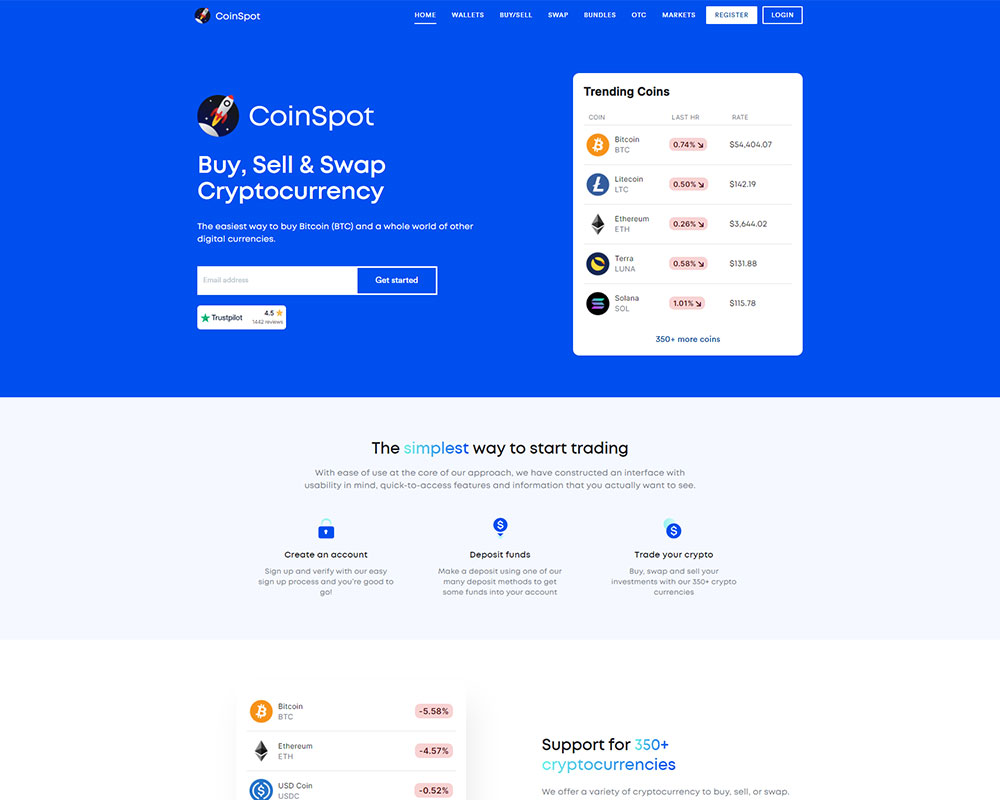
It has undergone the most audits and it’s the only Australian crypto exchange to receive ISO 27001 certification (extremely high information security). CoinSpot is also registered with Blockchain Australia, the Australian Digital Commerce Association and AUSTRAC. All of these organisations work to prevent technical mishaps, financial crimes, scamming and any other unsavoury business from occurring.
Secondly, if you’re looking for a simple, easy-to-use platform, CoinSpot is probably the best choice for you. CoinSpot’s user-friendly design makes it possible for a total beginner to navigate their app with ease.
Finally, CoinSpot’s selection of over 350+ different cryptocurrencies is the largest range in Australia making it a no-brainer for Australian crypto enthusiasts. On CoinSpot, investors can purchase all of the major crypto assets, such as Bitcoin (BTC), Ethereum (ETH) and Binance Coin (BNB) as well as a massive range of altcoins.
The only major drawback is that CoinSpot is only available for investors looking to trade in Australian Dollars (AUD).
You can check out our full CoinSpot review here.
Swyftx
Swyftx is another Australian-owned cryptocurrency exchange with a strong focus on security and user experience. They are an extremely solid choice for any investor looking for a secure and easily-accessible custodial crypto wallet.
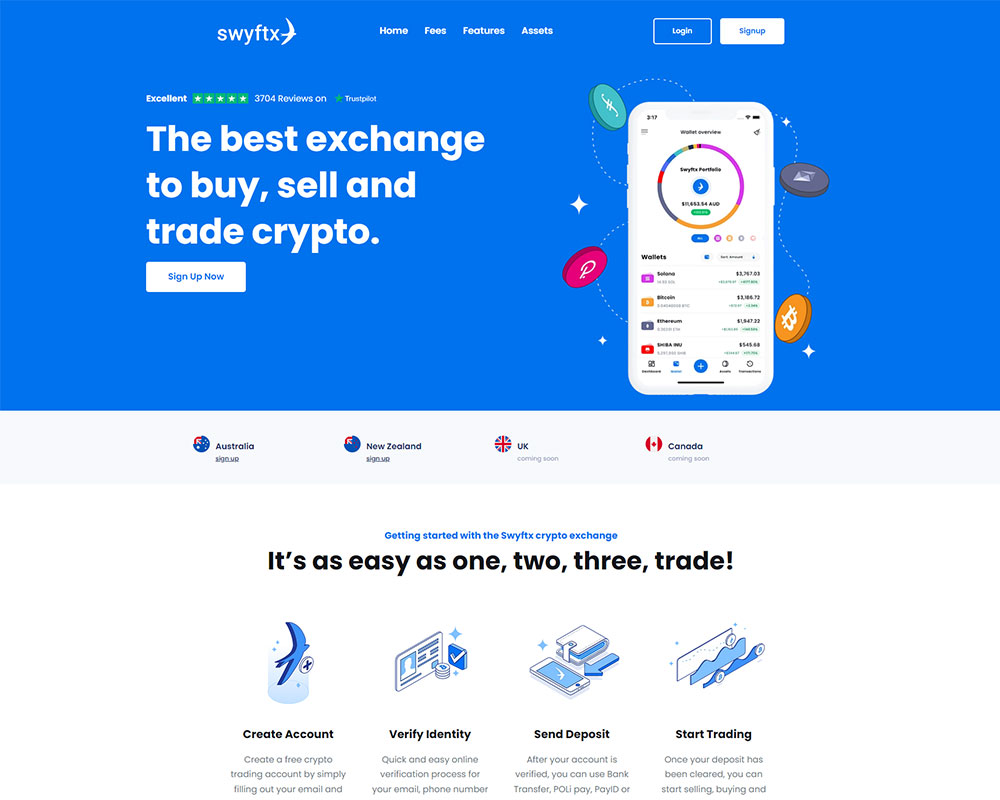
The Swyftx platform is beginner-friendly enough for a total newbie to navigate buying and selling crypto with ease, while also offering more technical features for the advanced traders out there.
While Swyftx doesn’t have ISO27001 certification like CoinSpot, they are registered with AUSTRAC and take a series of added measures to ensure that cryptocurrency stored on their exchange remains safe at all times. Like all major crypto exchanges, funds stored with Swyftx are covered by insurance to ensure that investors never lose funds even if the exchange were to be hacked.
Swyftx offers a competitive 0.6% fee on all trades, and have a selection of over 280+ cryptocurrencies for investors to choose from. They offer an advantage over CoinSpot by supporting more deposit features with less fees, allowing Australian investors to purchase cryptocurrency instantly via credit or debit card in AUD.
You can read our full Swyftx review here.
Crypto.com
Crypto.com is a Singapore-based exchange with over 10 million users. The exchange offers a wide array of different blockchain-based products—allowing users to stake their crypto, purchase NFTs and more. Crypto.com is for investors that are looking to do a little bit more than just buy and hold digital assets.

When it comes to your crypto wallet’s security on the exchange, Crypto.com is one of the most secure options that you can find. Crypto.com ensures that 100% of its user’s coins are backed-up in cold storage, meaning that even if the exchange were to be hacked and drained of all funds, every user’s coins would still be completely safe. Crypto.com also has $360 million in insurance against third party theft and potential damage to their cold storage units.
While Crypto.com does charge slightly higher fees than CoinSpot and Swyftx for deposits and various transactions, it makes up for this by offering a series of staking rewards for investors as well added benefits for those who choose to use the exchange’s native cryptocurrency—CRO.
Crypto.com has also recently partnered with VISA to offer the world’s first cryptocurrency-based debit & credit cards. These cards offer a series of perks, including free Netflix & Spotify as well as VIP airport lounge access for premium cardholders.
You can read our full Crypto.com review here.
Binance
Binance is the world’s largest crypto exchange based on both users and daily trading volume. It is well-known for its expansive range of cryptocurrencies, offering 350+ digital assets on the platform. Like Crypto.com, Binance offers an extensive range of blockchain-based products to investors, however, the user interface can be a bit challenging for new crypto investors.
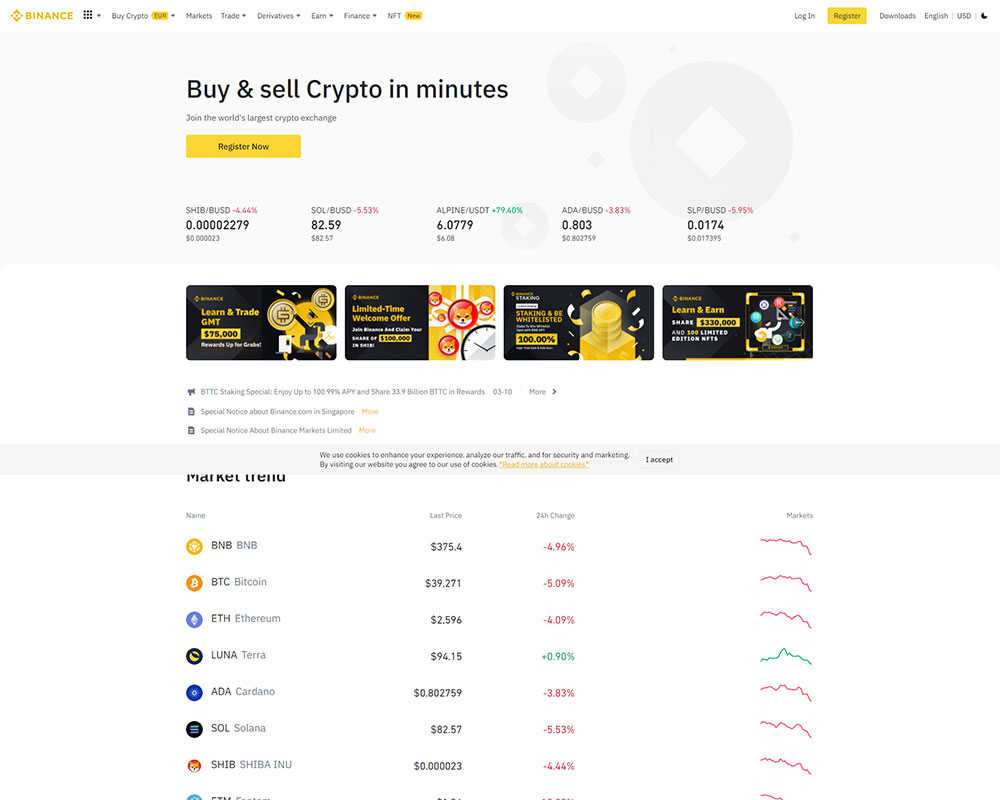
Binance is extremely security-focused and has only ever been the victim of one relatively minor attack in the past. Binance does not disclose what percentage of users digital assets are held offline in cold storage, however, they do state that all user’s funds are completely insured. This means that if Binance were to be hacked tomorrow and you woke up to find your crypto wallet empty, Binance will reimburse whatever you lost.
Binance offers some of the lowest trading fees, especially if investors use Binance’s native tokens: BNB and BUSD. While the exchange has a ‘Lite’ feature that simplifies the layout for new users, Binance also offers the most advanced features available for retail investors. So, if you’re comfortable with the more technical aspects of crypto investing and trading, Binance is definitely the exchange for you.
Seemingly in direct competition with Crypto.com, Binance is scheduled to release the Binance VISA Card later this year.
You can read our full Binance review here.
Coinbase
Coinbase is the largest cryptocurrency platform in the United States and offers a variety of features that make it suitable for Australian investors. Firstly, the Coinbase platform offers a series of educational tools to inform new users about cryptocurrency, even paying them to complete quizzes. Unfortunately for Australian users, Coinbase only denominates prices in USD and its fees are quite high relative to other more Aussie-suitable crypto platforms.
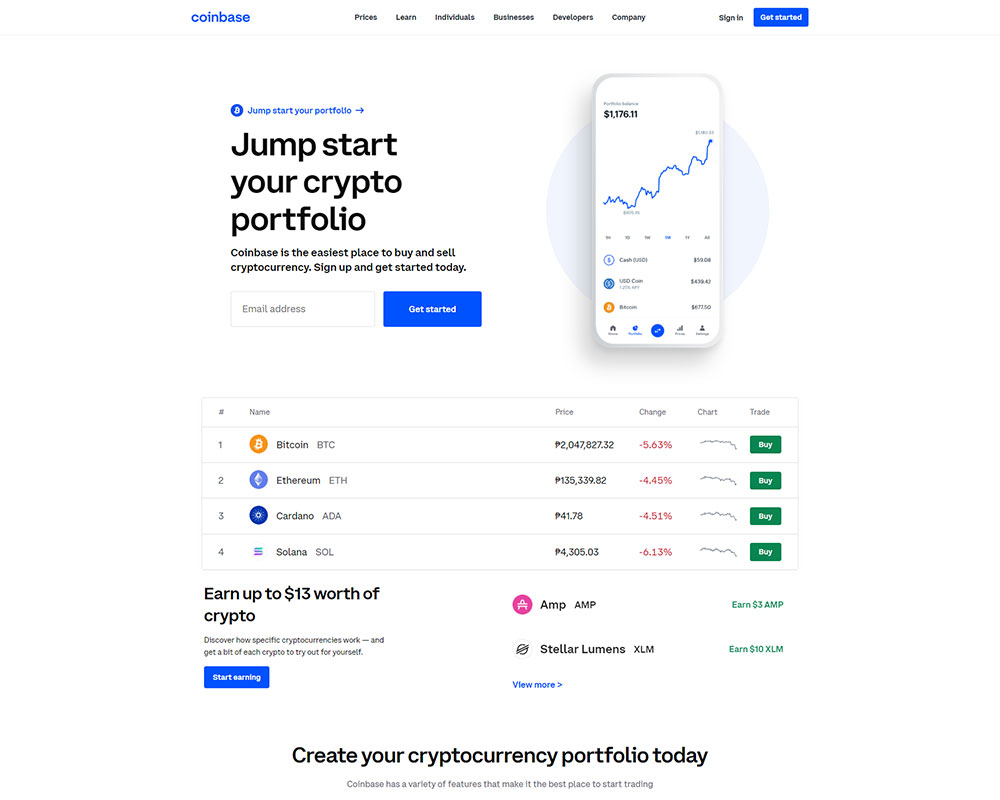
When it comes to the reliability of your crypto wallet, however, Coinbase is extremely secure—98% of all customer assets are stored offline using cold storage in a network of safe deposit boxes around the world. Coinbase also uses bank-standard encryption and security for its website and exchange.
While Coinbase may be very easy to use and provide a series of educational tools for new users, there are probably better platforms and exchanges that you can set up a crypto wallet with. Coinbase’s customer service regarding technical issues and malicious attacks has been extremely poor in the past—receiving lots of negative attention from thousands of angry users.
Check out our Coinbase review for a full, in-depth look at how this wallet performs.
Best Non-Custodial Crypto Wallets
Non-custodial crypto wallets have developed from clunky applications where investors would store their idle crypto—to fully interactive and highly usable features of the internet that provide access to different blockchains, metaverses and DApps.
Regardless of features, all non-custodial crypto wallets prioritise strong user ownership and control of crypto assets. When you transfer funds to a non-custodial crypto wallet, it is entirely yours as long as you maintain possession of your “seed phrase”.
Ultimately, non-custodial crypto wallets are for those who want direct control over their digital assets. As the early crypto enthusiasts would say: “Not your keys, not your coins.”
Trust Wallet
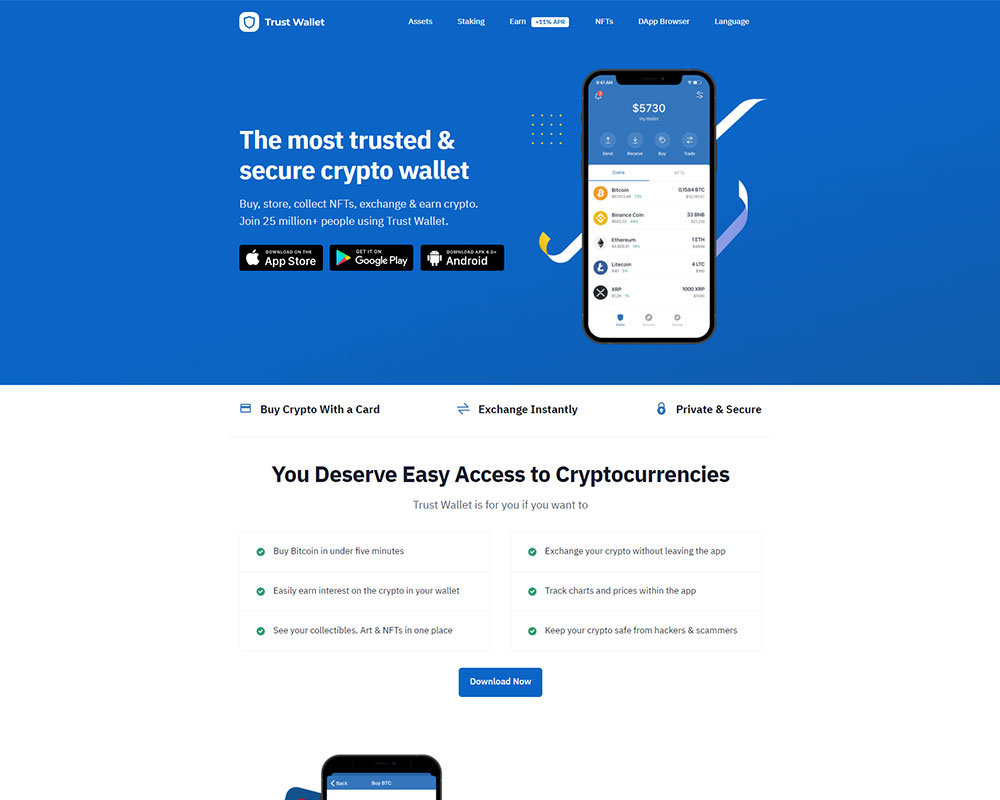
Trust Wallet is the official crypto wallet of Binance and is without a doubt, the stand-out choice for Australian crypto investors. Trust Wallet is designed with user experience in mind, is loaded with cool features that are easy to navigate, and supports a mind-boggling 1 million+ digital assets.
Trust wallet works by storing your private key locally on your phone, as well as allowing you to write down your recovery phrase separately. Your private key and recovery phrase never actually touch Binance’s servers, which means that it is essentially impossible to compromise unless someone steals your private key. You can also set up Trust Wallet anonymously without providing any personal details.
While Trust Wallet stores your crypto safely it also allows you to buy, sell or swap straight from the wallet. Staking and lending products are also available within the app. You can use Trust Wallet to store your NFTs, access DApps and DeFi platforms and even play blockchain-based games…
The only relatively minor downside of Trust Wallet is that there is no desktop version available.
Crypto.com DeFi Wallet
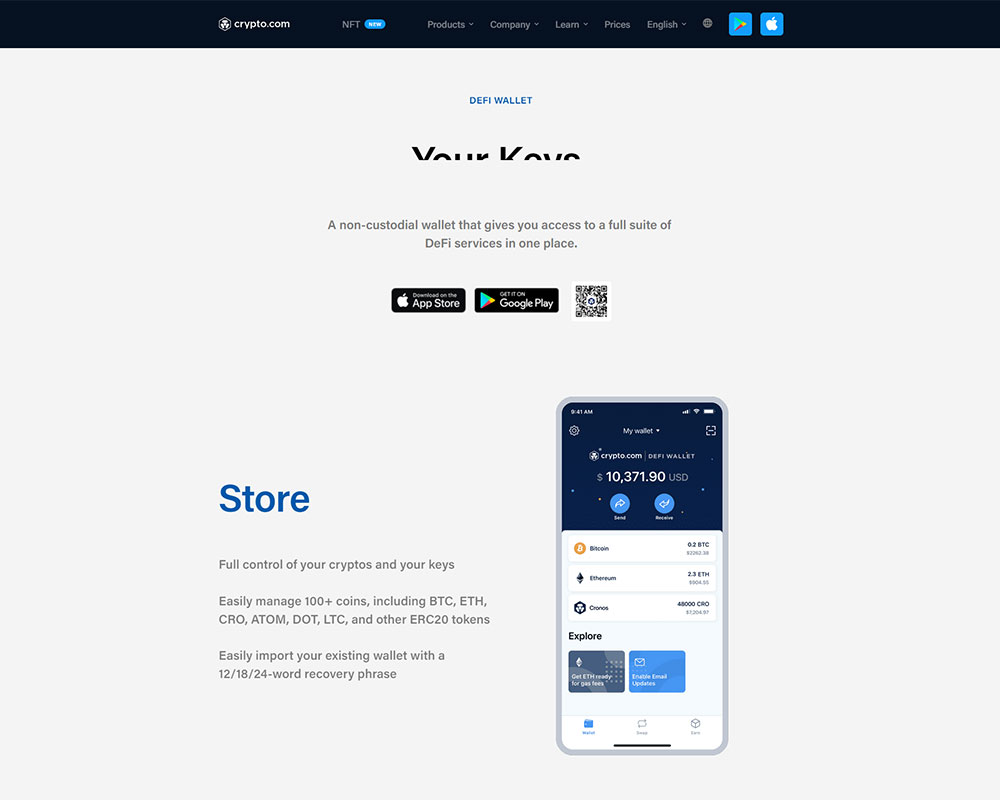
The Crypto.com DeFi wallet works in sync with the Crypto.com app, allowing users to transfer funds seamlessly from the exchange to their own private wallet. This crypto wallet really only makes sense to use if you’re a Crypto.com user, as it allows for full integration on everything Crypto.com related and provides massive incentives for using the CRO token.
The Crypto.com DeFi wallet supports more than 300 tokens and provides access to a variety of staking and lending products. More advanced users can access Crypto.com’s native Cronos Chain and trade a massive number of different tokens via the DeFi wallet.
Overall, this crypto wallet is extremely secure but it only makes sense for investors to use if they are already using the Crypto.com app as well. Investors that are not Crypto.com users would be much better off opting for Trust Wallet.
ZenGo Wallet
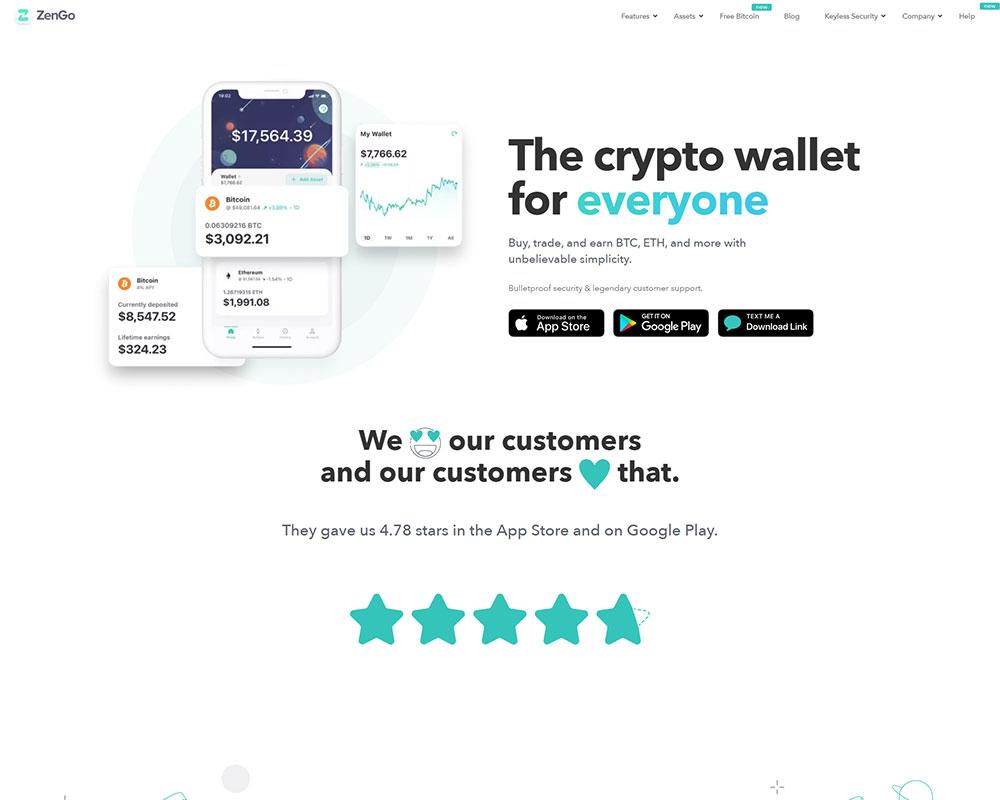
ZenGo made the list not just because of its user-friendly design and wealth of educational tools designed to teach new investors about crypto, but because of its incredibly unique security features. These simplify the process of securing a non-custodial wallet and provide an extra fail-safe, meaning that you can never truly be locked out of your ZenGo crypto wallet for good.
ZenGo decided that traditional private keys (a recovery phrase) are old news, and instead uses two independently created mathematical secret ‘shares’ instead. One share is stored on your phone while the other is on the ZenGo server. Because there’s no single point of failure, even if something happens to one of the shares, your crypto will remain secure.
ZenGo also took a new approach to 2FA (2-factor authentication), a relatively standard security feature in both crypto and the web more broadly. ZenGo instead implemented 3FA: 3-factor authentication. The three factors that keep your funds safe are email, a back-up file and a 3D biometric face map.
So, instead of you keeping a recovery seed phrase safely stored on a piece of paper somewhere, ZenGo’s restore options are based entirely on a biometric scan of your face. This means that even if your house burns down and you lose everything, all you would need to do is scan your face to match the 3D biometric face map, and your account is restored.
The major downside to ZenGo is that it only supports around 70 coins. Users can still buy and sell crypto directly from the wallet, however, the limited availability makes ZenGo a better option for storage.
MetaMask
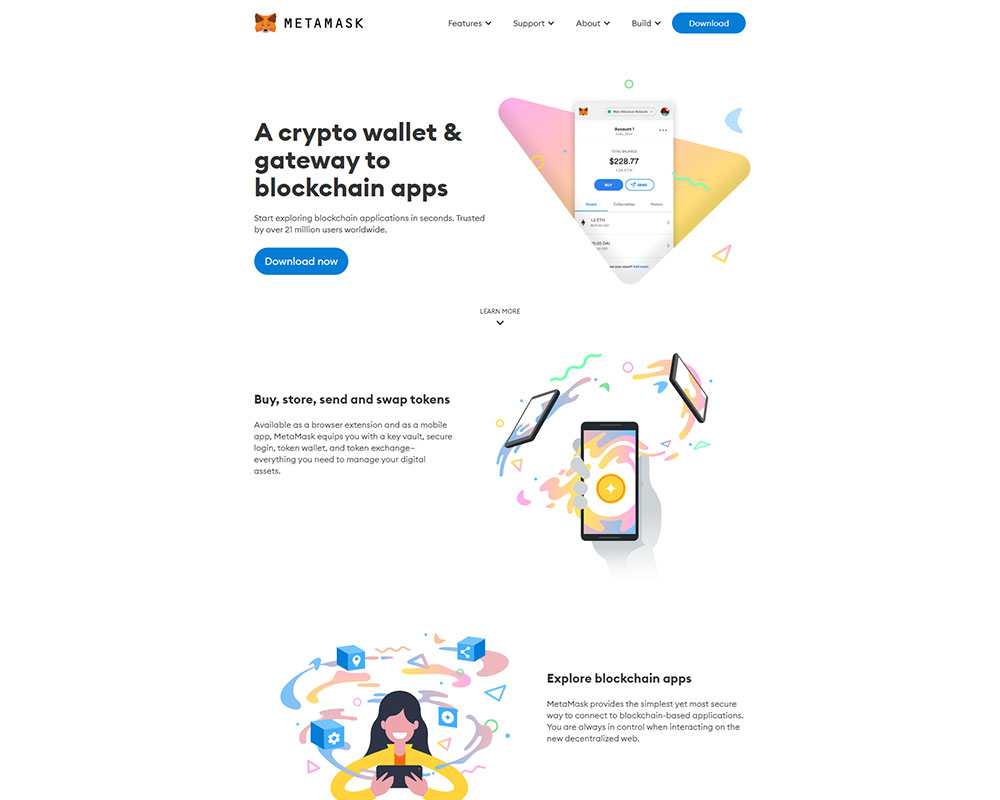
MetaMask is a good deal more complicated than the other wallets mentioned, but it is by far the most versatile digital wallet that automatically allows you to send and store ERC-20 tokens. You can also add a variety of different chains and networks manually on Metamask to store and exchange unique, lesser-known tokens.
Metamask was designed back in 2016 intending to assist crypto traders with moving niche pairs around on different blockchains. The MetaMask wallet works by connecting a regular browser like Google Chrome or Firefox to the Ethereum blockchain by acting as a browser extension.
MetaMask is one of the best choices for an all-round crypto wallet, as it allows more advanced crypto enthusiasts to access DApps and the different “metaverses”. If you want to get involved in the metaverse, having a MetaMask wallet is the way to do it, as sites like Decentraland and Sandbox require connecting a crypto wallet to get started.
It’s worth noting that when moving tokens around on MetaMask, you may need to modify the gas price (the charge you pay to miners) before sending tokens on the Ethereum network. Always make sure to check the gas price before you make a transfer on MetaMask, because you can accidentally end up paying through the nose for a relatively small transaction…
MetaMask’s smartphone app, MetaMask Mobile for Android and iPhone, was released in September 2020. Users can set up new profiles or log in with their existing MetaMask accounts using the smartphone app, which has the same features as the browser-based version, and allows users to manage funds on the go.
Best Bitcoin Wallet
Electrum
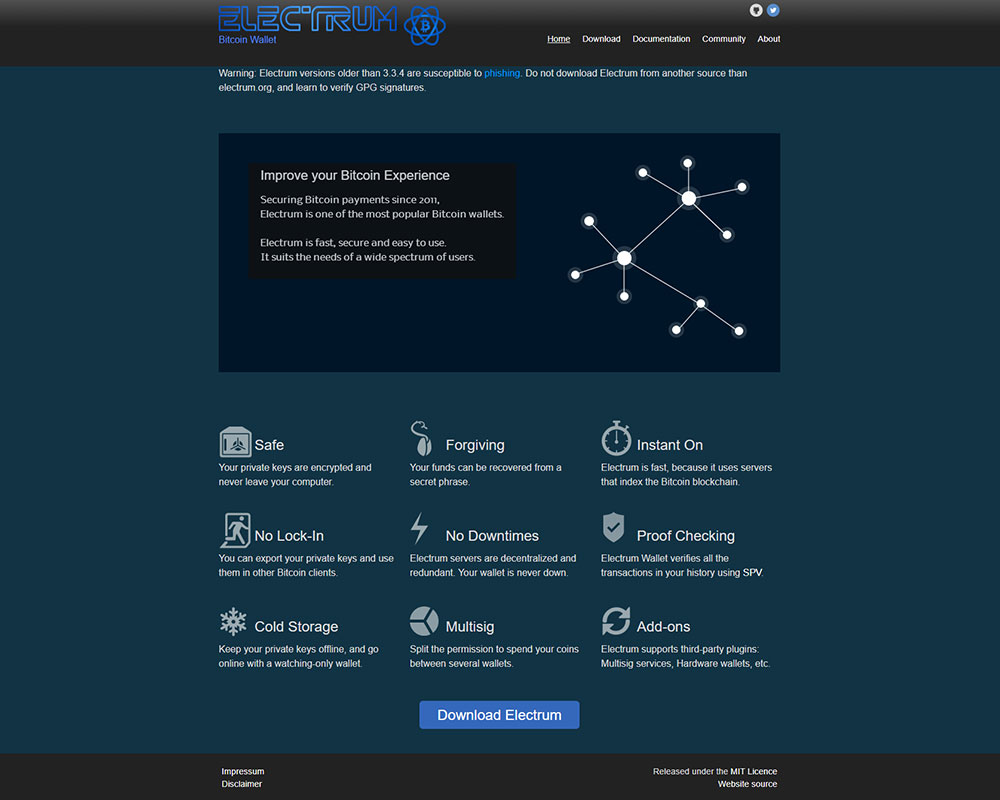
For the Bitcoin purists out there, Electrum remains one of the most trusted and well-established crypto wallets for dealing purely with Bitcoin. It’s a great choice for experienced users that have a solid understanding of Bitcoin.
The app has a pretty outdated interface and only supports Bitcoin, but what it lacks in cosmetics it makes up for with greater security and customisation than many other crypto wallets available for use. Electrum is open source, which means that many software developers have reviewed its code, minimising the chance of dangerous flaws in the software to essentially zero.
When using Electrum, you can choose the level of security you wish to use. For example, you can create a completely standard crypto wallet, a crypto wallet with 2FA (2-factor authentication), or a multi-signature wallet (extremely secure). You can add custom words to your recovery seed phrase, to increase security even further.
Electrum is by far the best option for those who are a little more tech-savvy and are looking to exclusively purchase Bitcoin to hold it securely for a long period of time.
Crypto Wallet Security Tips
What Happens If I Forget My Crypto Wallet Password?
If you forget your password to a custodial (exchange-based) crypto wallet, you are usually able to reset it on the exchange’s website. Your crypto exchange will usually send you an email with steps to reset your password. This is one of the major advantages of using a custodial wallet—your funds can always be recovered if you forget or lose your password.
For non-custodial crypto wallets, however, you will only be able to access it if you have your recovery seed phrase. If you lose your recovery / seed phrase you will be locked out of your crypto wallet permanently, so make sure you store your recovery phrase somewhere extremely secure where you will never lose it.
How Do I Safely Store My Recovery Seed Phrase?
If you’re deadset on storing your crypto in a non-custodial crypto wallet regardless of whether it is hot or cold, it is extremely important to write down the recovery seed phrase in the correct order and store it safely in case you need it in an emergency.
The best practice is to store your recovery phrase on paper, not electronically, otherwise, there is a risk it can be stolen by hackers. Handwrite your recovery seed phrase so there is no trace of it on your computer, and make sure it is legible. Double-check that you have written it down correctly and number each word so that you can’t mistake the order of the words.
Read Next
